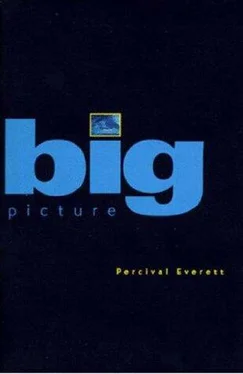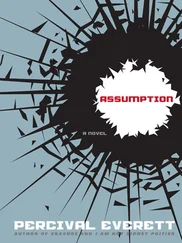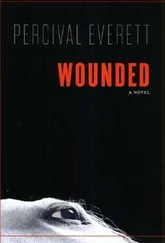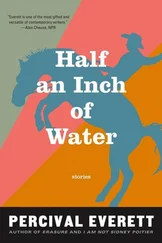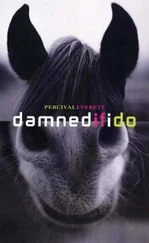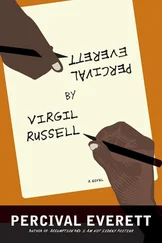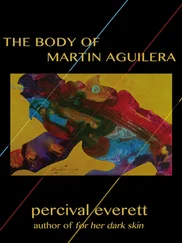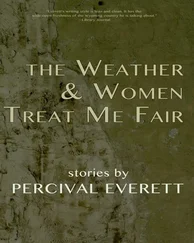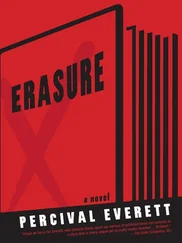Michael moved his coffee to the next table. Then he and the waitress stood on the maroon vinyl seats of the booth, on each side of the boar’s head, and took it down from the nail on which it was hooked.
“I’m going to miss you, Dicotyles tajacu ,” the waitress said. “I’ll get some newspaper.” She stepped back and looked at it there on the table before walking away.
Michael was able to examine the head more closely now. The hair was worn away on top of the skull between the eyes, and the tusk on the right side was broken. The surface of the protrusion was Indian Red and mustard. The hole where the left eye had been, and later whatever kind of glass ball had replaced it, was full of caked dust and cobwebs. He imagined the pain when the wind blew through an empty socket to the exposed nerves.
The waitress returned with a stack of Rocky Mountain News and spread a few sheets out on the floor. She made a mat using masking tape to secure the seams. Michael regarded how carefully she worked, as she kept adding more paper. Her hot-pink-painted nails sliced the tape precisely; the palms of her small but fleshy hands pressed the adhesive flat as the plane of paper grew into a rug. Michael stood, lifted the head from the table, and set it down. The two of them stepped back and studied the head.
The waitress got back down on her knees and brought the opposite edges of her newspaper rug up to meet at the bald spot between the eyes. She taped it closed, then proceeded to fold shut the gaps by using more paper until finally the Dicotyles tajacu was securely wrapped.
“I never did get anything to eat,” Michael said, looking at the waitress. “I don’t imagine it would be a good idea to order something now.”
The waitress didn’t say anything, nor did she move her head or any other part of her round little body, but she made it clear she was in agreement.
Michael picked up the head; the newspaper crackled in his arms. “Okay, then. Thanks.” He left the restaurant struggling with the door; the bell hanging from the door handle hushed as it caught between his thigh and the glass. Michael put the pig on the passenger seat of his truck. He left it wrapped in spite of his urge to open its one-eyed face to the world. He put the truck into gear, released the brake, and rolled away, listening to an exhaust tick in his engine that he had not previously noticed.
Michael stopped in Laramie outside a pawn shop to use a pay telephone. First he checked the answering machine at what used to be his home, noting with some disappointment that his action betrayed a failure to completely disengage. That failure was underscored by his feeling of deflation on not finding any messages. He placed a second call to his agent in Santa Fe.
“Hello, Gloria,” Michael said. “I’m on the road and I can’t be reached for a while.”
“What’s the matter now?” Gloria asked.
Michael imagined the stout woman sitting in the overstuffed chair in front of her television. “Nothing’s the matter. My wife is having her pimples cured by the handsome Dr. Bob; I’ve left the house; and I burned all the new paintings.”
“You didn’t.”
“I did. Like I said. I can’t be reached. I’ll call you soon. I never loved her anyway.”
“When you loved her, you became despondent and tried to kill yourself. Now, you claim you never loved her and so you destroy your work.”
The head of the Dicotyles tajacu was wrapped in newspaper, sitting on the seat of the truck, dead for twenty-five years, but still breathing. Michael could hear it. He left the boar while he went into the deli near the train tracks for lunch since his stomach was complaining and feeling tight. He sat alone, undisturbed, and ate a vegetarian sandwich from which he pulled out the cucumbers and heard the waitress say, “I don’t like those either.”
Outside, the air had turned crisp and Michael found himself stepping quickly toward his truck. He was struck suddenly by the distance, not the physical distance, not the miles, nor the change in landscape, but the remoteness from the life he had known just a few days before. He was still a painter: he could buy oils and brushes and canvas and make pictures and there were paintings in the world bearing his mark, but he was no longer a husband, no longer a lover, and he no longer resided in that house in Denver with the detached studio and pool he never wanted.
“Michael?” the voice found him just as he was opening the door of his truck.
Michael turned around. It was Harley Timmons, a sculptor who lived in Laramie, who worked in steel and found objects, who by all measures, in Michael’s thinking, was severely untalented, although not unsuccessful. Harley was a heavy man, brawny from lifting steel and working with welding equipment. He had wide-set eyes and an extremely narrow and large nose, which looked like a fin on his face.
“Michael Lawson,” Harley said. “I don’t believe it. I saw the truck and I said, hey, that looks familiar, then I saw this black guy getting in it and I said, hey, that must be, and it is. How are you doing?”
“Oh, I’m fine,” Michael said. “How are you, Harley?”
“Great.” Harley pumped Michael’s hand and showed big muscular teeth. “I’m just great. What brings you up here?”
“Came up to do a little camping and fishing,” Michael said, noting as the last word was out, that he had no camping and fishing gear in his truck. “Headed up to the Winds.”
Harley nodded, still flexing his smile. “Why don’t you spend the night here and have dinner with Sumiko and me?”
“I don’t know.”
“I insist. We’ve got a new guest room we haven’t tried out on anyone yet. Come on. You can tell me about the new work.” Harley’s face seemed so close.
Michael fell back, if not physically, inside. New work? The prospect of discussing the nonexistent was just depressing enough to sound intriguing, he thought. He said, “Okay.”
“Well, great, just great,” Harley said. “I’m sure there’s stuff you’ve got to do, so I’ll just tell you that dinner’s at seven, but come anytime you want.”
“Thanks.”
“Great.”
“Great,” Michael said. He watched Harley walk away and disappear into the Whole Earth Grain Store in front of which a young woman in a peasant dress swept an already tidy sidewalk.
Michael got into his truck, agreeing with Harley that he probably had some things to do, like maybe buying some camping gear or a fishing rod. That’s what he did. He went to a sporting goods store and bought a sleeping bag, a backpack, a campstove, a couple of bottles of white gas, a small tent, a canteen, a four-piece pack fly rod, a reel, two fly boxes, and an assortment of flies, stoneflies, Woolly Buggers, Royal Coachmen, Zug Bugs, sizes 8 to 12, and a fishing license. His bill came to 418 dollars and 47 cents. He paid with his American Express card and a young man helped him carry his new stuff to his truck.
After he bought all of this gear, Michael was eager to get on the road and do some camping; he felt an excitement he hadn’t felt in years. But he had told great big Harley that he would be there and, although Harley was not important to Michael, it would be impolite not to show up and awkward trying to explain why he was leaving Laramie just late enough to find a campsite in the dark of night. Michael drove out Ninth Street and into the canyon north of town where he pulled off onto a side road, sat in the back of his truck, and sorted the flies into the compartments of the fly boxes. He classified them slowly, by kind and size, and paid careful attention to their placement.
He left for Harley’s house just as the sun was nearing the top of the Snowy Range. He drove into Laramie on Ninth, then turned left on Grand Avenue over to Seventh where in 1913 or so a black man had been lynched on a pole that was still standing, now shouldering power and phone lines. The man had been dragged out of jail by citizens who were chastised the next day by the editor of the town paper for being such poor shots. Out of the hundreds of rounds fired at the hanging man only one bullet found its mark. Michael always looked at the pole as he drove by; the cracked and weathered brown pole pressed against the sky, which tonight was washed lavender at sundown.
Читать дальше
